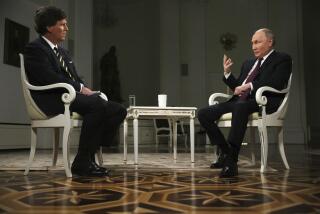Reagan Won’t Get to Wish Soviets ‘Happy New Year’ : Kremlin Wants ‘No Illusions’
- Share via
MOSCOW — The Kremlin today rejected a U.S. proposal for a televised exchange of New Year’s greetings by President Reagan and Mikhail S. Gorbachev, saying superpower relations are too strained to repeat 1986’s good-will messages.
“We have no basis for the exchange of such New Year’s messages,” Foreign Ministry spokesman Gennady Gerasimov said. “We should make joint efforts to correct the situation and have foundations for optimism.”
He summarized disputes dividing the United States and the Soviet Union and asked: “Why should we create any illusions about our relations?”
Gerasimov also told a year-end news conference: “We are going to democratize and restructure our society and I hope you will have a lot of interesting subjects to write about this (next) year.”
But he refused to elaborate or provide examples of what he meant by “democratization.”
‘Unfortunate’ Decision
In Washington, State Department deputy spokeswoman Phyllis Oakley called the Soviet decision “unfortunate.” She said Reagan’s New Year’s greeting to the Soviet people will be broadcast by the Voice of America.
Gerasimov told reporters U.S. Ambassador Arthur Hartman had proposed that the exchange of taped messages by the leaders agreed to last year be repeated.
Under the arrangement, an address from Reagan to the Soviet people was broadcast on New Year’s Day of 1986 at the beginning of Soviet television’s evening news program.
The broadcast was the first time a U.S. President had addressed the Soviet people on television since Richard M. Nixon did so during a Moscow summit in 1972.
Both years, U.S. television networks in turn broadcast addresses by Soviet leaders.
A Surprise for Viewers
The Soviets minimized Reagan’s exposure last year by not announcing his appearance in advance. When he suddenly appeared on television screens viewers were startled. The Soviet media called Reagan’s speech a “disappointment” but many Soviets said they found him charming, although not completely convincing.
Gerasimov said today that superpower disputes over arms control, treaty commitments and nuclear weapons tests made an exchange of messages impossible.
“We believe that an exchange of television addresses is a good thing,” the Soviet official said. “But why instill in people illusions that everything is in order?”
U.S. Embassy spokesman Jaroslav Verner said the embassy had been told of the Soviet decision before Gerasimov’s announcement.
Gerasimov, in summarizing disputes dividing the superpowers, said: “The Reykjavik agreements are not being followed, not being observed by the United States.”
He added, “The United States has also violated the quantitative limits of the SALT II treaty and is going to violate it by deploying a new type of missile.”
Gerasimov said U.S. plans to develop and deploy the “Midgetman” missile also would violate SALT II. Finally, he called attention to the Reagan Administration’s refusal to follow the Soviet example and halt nuclear testing.
More to Read
Sign up for Essential California
The most important California stories and recommendations in your inbox every morning.
You may occasionally receive promotional content from the Los Angeles Times.













